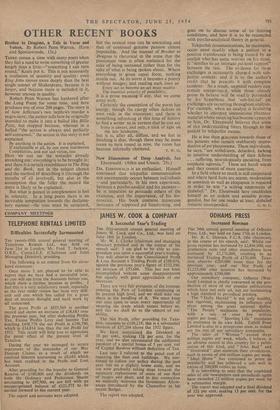OTHER RECENT BOOKS
THERE comes a time with many poets when they feel a need to write something of greater length than a lyric—"something I can turn round," Keats put it. This is not necessarily a confusion of quantity and quality: even King John moves more deeply than the best single sonnet of Shakespeare, because it is larger, and because more is included in it, however uneven in quality.
Robert Penn Warren has hankered after the Long Poem for some time, and here produces one of over 200 pages. The story is of how Jefferson's two nephews murder a negro slave; the author tells how he originally intended to make it into a ballad like Billie Potts, but stopped because, whereas in a ballad "the action is always and perfectly self-contained," the action in this story is not explained By anything in the action. It is explained, If explainable at all, by our most murderous Complicities, and our sad virtue, too.
Here we can see the tentacles already stretching out: everything is to be brought in; and there is a certain resemblance to The Ring and the Book, not in the subject chosen and the method of describing it (through the mouths of all involved), but also in the assumption that the fuller the record the more is likely to be explained.
But what is gained in completeness is lost in intensity. In a long poem there is an inevitable temptation towards the declama- tory manner--the tone must be sustained, but the neutral tone can be unexciting and that of continual genuine passion almost impossible. And the manner of Brother to Dragons is rhetorical in the sense that the passionate tone is often sustained for the sake of being sustained rather than for the sake of what is being spoken about. Where everything is given equal force, nothing stands out. At its worst it becomes a poetry without images; and reading such lines as
Every act to become an act must resolve The essential polarity of possibility, it is a prose meaning if any, that we come away with.
Certainly the conception of the poem has energy, though the energy often defeats its own ends in the execution; and there is something refreshing at this time of history to find a writer so in earnest that he can say Irony is always, and only, a trick of light on the late landscape; but it is, after all, diffuse, and we feel in finishing it that, though there may be more room to turn round in now, the room has
become infernally cluttered. T. W. G.


































 Previous page
Previous page